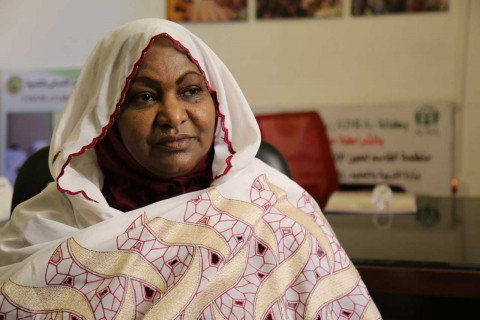
GCED Basic Search Form
Quick Search
You are here
News

Ahead of World Humanitarian Day on 19 August, OCHA is celebrating humanitarians who are playing an important role in saving and protecting people’s lives despite conflict, insecurity, lack of access and the added challenges of COVID-19.
By Nahla Zarroug, Communications Officer, and Saviano Abreu, Head of Communications, in Khartoum, Sudan
When we met Khadiga Al Gassim at the office she works in with her colleagues in Khartoum, Sudan, we realized that the humanitarian world is not something new to her. With a calm and warm voice, she explained how she left – almost 10 years ago – her long career and senior positions with national and international organizations to create the volunteer-based non-governmental organization (NGO) Al Gassim for Humanitarian Aid and Development (AGHAD).
Khadiga felt it was a good moment to leave the structures behind the development of polices to alleviate poverty to be one of the front-line responders. And until now this strong woman, already in her sixties, wakes up early every day and works hard to mobilize help and provide food to the most vulnerable people, support orphans in the poor neighbourhoods of Karthoum, help people displaced by floods across the country, and empower women to protect them against gender-based violence.
Khadiga explained how AGHAD manages to provide daily meals to more than 18,000 people living on the outskirts of Khartoum, with the funding the organization collects only from its own volunteers and supporters. But Khadiga believes that more has to be done. “Since COVID-19, prices are increasing, people have lost their jobs, and more and more people need help,” she explained. Hunger has indeed increased in Sudan.
The ongoing economic crisis, high inflation rates, and necessary measures to contain the COVID-19 pandemic have pushed up food prices in the country. Now, more than 9.6 million people in Sudan are going hungry every day, 65 per cent more compared with the same period in 2019.
A clear example of this is the increasing demand for the school-feeding programme that Khadiga and her team support in River Nile State. “We directly pay the school meal for 150 students whose families cannot afford it. Many other schools approached us for the same support, but unfortunately AGHAD does not have enough funding,” she said.
Khadiga is most proud of the work her organization is doing to help vulnerable women. Women’s empowerment is a cause dear to her heart, and seeing women rise from extreme poverty or situations of violence, to be able to stand on their own, inspires Khadiga to continue her work. “Since the start of the programme, over 3,000 women have become literate and acquired income-generating skills. Now they can support their children and families,” she said.

Women from Karrary Locality, in Khartoum State, Sudan, receive their certificates after completing their studies in the literacy programme organized by AGHAD, with the support of ADRA. Credit: AGHAD
Despite the challenges and all this work, Khadiga does not seem tired. “When you work with vulnerable people who are in dire need of assistance, no matter how much you do, you still feel it is not enough and you need to do more,” she said.
Khadiga has a dream: to mobilize more support, assist more people and, in particular, empower more women. “The journey is long. Working in the voluntary field requires participation, partnership and support at the national, regional and international levels to achieve our goals. Women’s empowerment starts at the grass-roots level and, from here, we can help not only women in Sudan but women all over the world,” she said.
URL:
